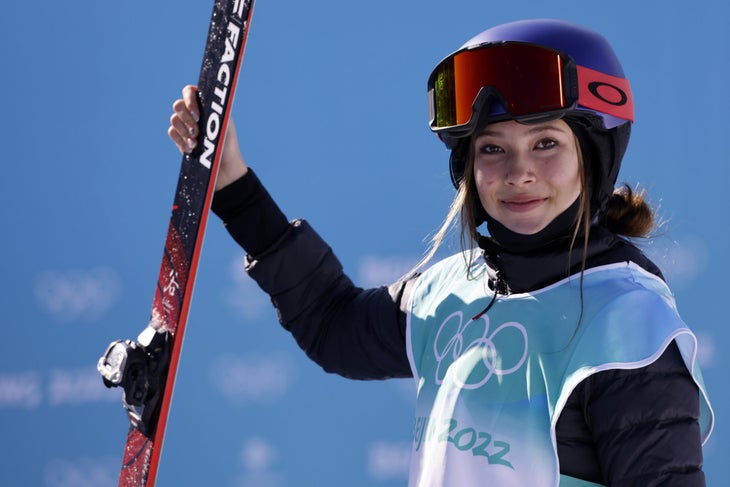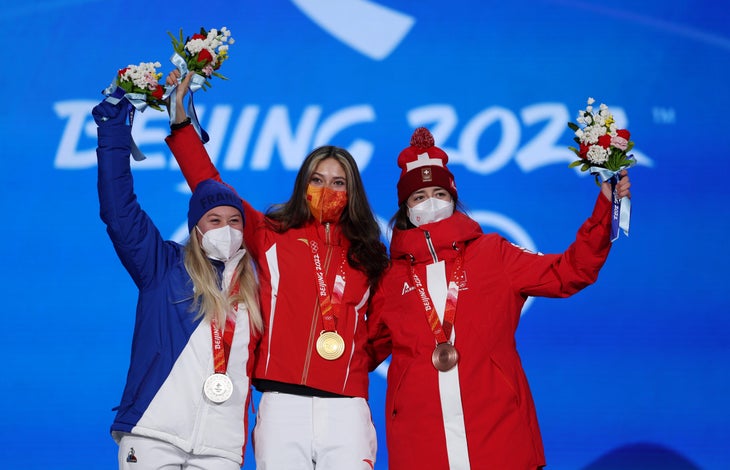Products You May Like
Receive $50 off an eligible $100 purchase at the Outside Shop, where you’ll find gear for all your adventures outdoors.
Sign up for Outside+ today.
With the cooling towers of a long-defunct steel mill as a backdrop, U.S.-born Eileen Gu put on just the show everyone expected for her Olympic debut—and then some. Skiing for her mother’s native China, Gu didn’t even need her third run in the Freeki Big Air final at Beijing’s Big Air Shougang on Tuesday morning. She was already guaranteed a bronze medal in the brand-new Olympic event. The combined score from her first two runs would have sufficed.
But if Gu wanted to bag gold for China, she had to do something colossal. Colossal and, perhaps, unprecedented. Indeed, the only way to inch up the leaderboard was to throw a trick so show-stopping that it would out-score and cancel out one of her earlier tricks (a double-cork 1440 and a double-cork 1080 with two grabs) in the best two-of-three run format.
So she called her mom, Yan, for advice.
“Do another 1440 to get silver,” Yan said.
“I said, No!” Gu recalled, defying her mother, who was in China with a broken leg from a snowboarder collision two months ago.
“Alright, it’s your call, your decision. I hope you enjoy it,” Yan replied.

As the world watched—including International Olympic Committee President Thomas Bach, who was in the bleachers next to the tennis player Peng Shuai, whose whereabouts had been a mystery for months—Gu took off down the ginormous in-run and hucked a trick she had never before attempted.
Gu threw the first 1620 of her life. And stuck it! The IMG model had lived up to the hype. The 18-year-old Californian had a new score: 188.25 en route to what she hoped would be the first of three gold medals for the host nation at the Beijing Games.
Mathilde Gremaud of Switzerland was next, but the 2018 Olympic slopestyle silver medalist crash-landed her 1620, lost both skis and and left a yard sale at the base of the kicker on her 22nd birthday.
Still, Gremaud said, “It was insane! I gave it all I had. I’m so happy to have come away with a medal. It’s the best present for sure.”
And then there was one: Tess Ledeux of France, the last competitor. The 2019 world champion and 2022 Winter X Games gold medalist had already landed a 1620 in her first run. To surpass Gu, she went for a switch 1440 with a stylish double-handed grab, but a one-legged landing didn’t boost her score. In the end, 0.75 points was the difference between gold and silver.
At the base, Ledeux, 20, sat and sobbed. Gu and Gremaud approached her.
“I said, ‘I’m so proud of you,” Gu recalled. “I told her, ‘The performance you had—your achievement—actually drove me to achieve my [first] 1620. I [told] her that a part of this gold belongs to her.”
Ledeux herself had only landed her first 1620 in training back in November. She landed it competition for the first time just a few weeks prior to the Games.
“The 16 of Eileen was a big surprise today,” Ledeux said. “Bravo to her. She killed it again today and I’m still stoked to grab second place. I’m stoked to land all my tricks today. I’m proud of me.”
After the medal ceremony, Gu explained in fluent Mandarin her clutch decision to throw the 1620. “At that time, I was thinking … I’m not here to beat my opponents. I’m just trying to be better than myself. No matter whether I land that trick, I win because the whole world can see my spirit. With this, I want all the other girls to break their boundaries. They will think: If Eileen can do it, they can also do it.”
Gu said that she felt surprisingly confident going into it. “I played piano for nine years so I am very attuned to the sense of rhythm. I think of all my tricks as a rhythm in music and motion,” she explained. “The wind in my ears, the speed of my turn, when I wrap the spin, the change in tempo. I was thinking about that going into the trick. I felt very confident that if I didn’t land it, I would be safe. I would still be able to participate in my other two events.”
Gu was remarkably congenial during her half-hour press conference, even when asked (several times) about the status of her citizenship. China doesn’t allow dual citizenship, and she had never publicly said whether she had relinquished her U.S. passport when she started to represent China in 2019. Asked to clarify, Gu parried with diplomacy.
“Sport is a way we can really unite people,” she said. “It doesn’t have to be related to nationality. We are all out here together pushing the human limit. When the other two athletes were going through their own emotions at the end, I went over to them and made it clear that I won because of them, because they had inspired me so much. They had made me the skier that I was. I wanted to express my gratitude. We are all out here doing this together. We’re pushing the sport together—especially women’s skiing.

Gu later added, “This was the most progressive season in women’s freeskiing, for sure. I mean, look at this contest! There was Tess [Ledeux] doing a switch 14, and a 16. Mathilde [Gremaud] was doing a 14. Johanne [Killi, of Norway] was doing a 14. I was doing a 14 and a 16. I think we all did that together. I think the Olympics were an amazing motivating force for us, to time our tricks to peak at the right time. I’m so honored to be a part of it. I think women’s skiing is improving exponentially right now.”
“I’m hoping a little girl at home sees [us] girls on TV and that it’s her first time hearing about freeskiing” Gu added. “I think it’s so different hearing about freeskiing form a girl than to hear about it from a middle-aged man. Representation is so important, especially in women’s sports. If we want to make progress, I think we have to represent ourselves well, and I think we are. I’m really proud of all the girls in the field today.”
The lone American in the final, Darian Stevens, placed 11th with a switch 1080 and a new double cork 1440 that she had tried for the first time in practice earlier in the day.
“Gotta go big in big air, right?” said Stevens who competed with a plush toy hanging out of her right pocket all day.
Stevens’ three Americans teammates were eliminated after Monday’s qualifying round. Marin Hamill placed 14th, Maggie Voisin finished 15th, and Caroline Claire was 24th.
Next: Gu and all four Americans are expected to return for ski slopestyle qualification on Sunday, Feb. 13, followed by Monday’s final. After that, Gu will vie for a third medal in women’s ski halfpipe Feb. 17-18.
